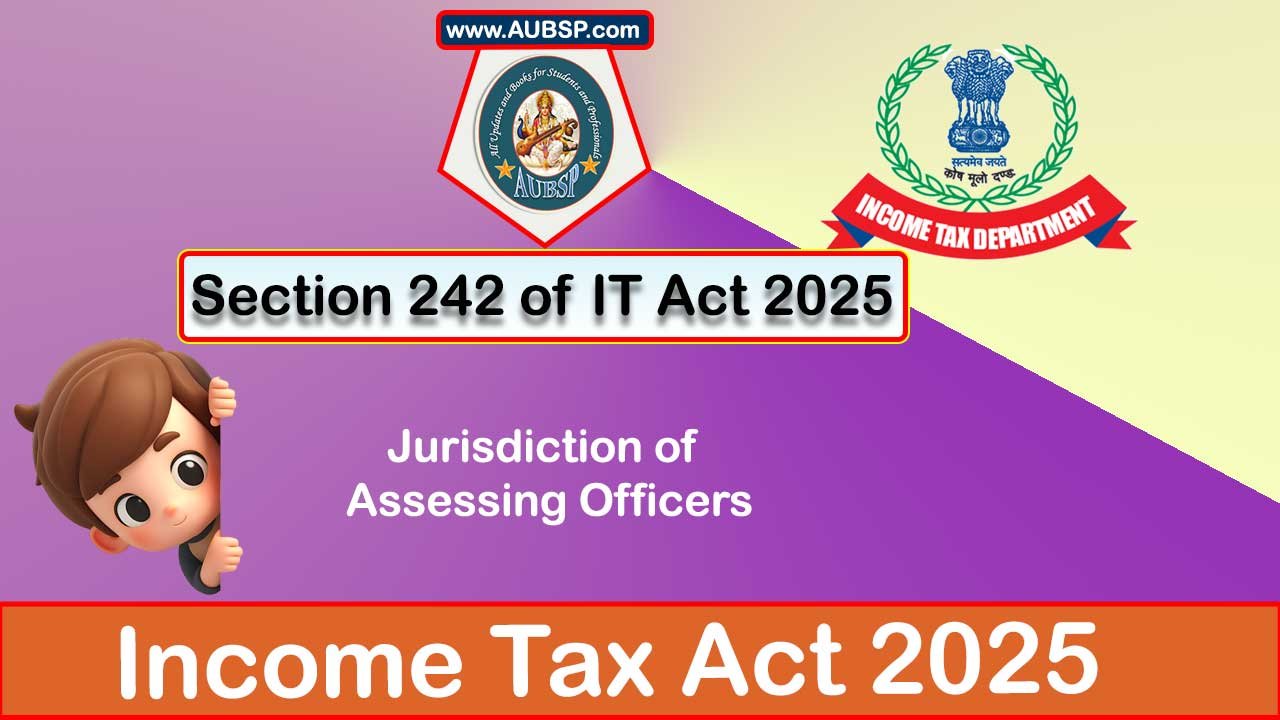Jurisdiction of Assessing Officers
[Section-242 as per the Income Tax Act, 2025 (this Act) w.e.f. 1st April, 2026.]
Section 242(1) of Income Tax Act 2025
242(1) Where an Assessing Officer has been vested with jurisdiction over any area by virtue of any direction or order issued under section 241(1) or (2) or (3), he shall have jurisdiction within the limits of such area,—
- (a) in respect of any person carrying on a business or profession, if the place at which he carries on his business or profession is situated within the area, or where his business or profession is carried on in more places than one, if the principal place of his business or profession is situated within the area; and
- (b) in respect of any other person residing within the area.
Section 242(2) of Income Tax Act 2025
242(2) Where a question arises under this section as to whether an Assessing Officer has jurisdiction to assess any person, the question shall be determined by the specified income-tax authority.
Section 242(3) of Income Tax Act 2025
242(3) Where under this section, a question arises relating to areas within the jurisdiction of different specified income-tax authorities, the question shall be determined––
- (a) by the concerned specified income-tax authority concerned; or
- (b) if they are not in agreement, by the Board or by such specified income-tax authority as the Board may, by notification, specify.
Section 242(4) of Income Tax Act 2025
242(4) No person shall call in question the jurisdiction of an Assessing Officer,––
- (a) where he has made a return under section 263(1), after the expiry of one month from the date on which he was served with a notice under section 268(1) or 270(8) or after the completion of the assessment, whichever is earlier;
- (b) where he has made no such return, after the expiry of the time allowed by the notice under section 268(1) or 280(2) for the making of the return or by the notice under section 271(2) to show cause why the assessment should not be completed to the best of the judgment of the Assessing Officer, whichever is earlier;
- (c) where an action has been taken under section 247 or 248, after the expiry of one month from the date on which he was served with a notice under section 153C(2) of the Income-tax Act, 1961 or section 294(1)(a) or after the completion of the assessment, whichever is earlier.
Section 242(5) of Income Tax Act 2025
242(5) Subject to the provisions of sub-section (4), where an assessee calls in question the jurisdiction of an Assessing Officer, then the Assessing Officer shall, if not satisfied with the correctness of the claim, refer the matter for determination under sub-section (2) or (3) before the assessment is made.
Section 242(6) of Income Tax Act 2025
242(6) Irrespective of anything contained in this section or in any direction or order issued under section 241, every Assessing Officer shall have all the powers conferred under this Act on an Assessing Officer in respect of the income accruing or arising or received within the area, if any, over which he has been vested with jurisdiction by virtue of the directions or orders issued under section 241(1) or. (2) or (3) or section (4).
FAQs on Section 242 of Income Tax Act 2025
What determines the jurisdiction of an Assessing Officer over a person carrying on a business or profession?
An Assessing Officer has jurisdiction over a person carrying on a business or profession if the business or profession is carried on at a place situated within the area assigned to the officer, or if it is carried on in multiple places, the principal place should be within that area.
Who has jurisdiction over a person not carrying on any business or profession?
Jurisdiction lies with the Assessing Officer in whose assigned area the person resides.
How is jurisdiction decided if a question arises regarding it under Section 242?
The question is determined by the specified income-tax authority under Section 242(2).
What happens when the jurisdiction question relates to multiple specified income-tax authorities?
It is decided either by the concerned specified income-tax authorities themselves or, if there is disagreement, by the Board or an authority specified by the Board as per Section 242(3).
Can a taxpayer challenge the jurisdiction of an Assessing Officer?
Yes, but only within the prescribed time limits mentioned in Section 242(4). After those limits, jurisdiction cannot be questioned.
When is the deadline to challenge the jurisdiction if a return has been filed?
The deadline is one month from the date of service of notice under Section 268(1) or 270(8), or before completion of assessment, whichever is earlier.
What is the deadline to question jurisdiction if no return has been filed?
It is the expiry of the time allowed in the notice under Section 268(1), 280(2), or 271(2), whichever is earlier.
Is jurisdiction challenge allowed in search and seizure cases?
Only within one month from the service of notice under Section 294(1)(a) or before the completion of the assessment, whichever is earlier, as per Section 242(4)(c).
What happens if a taxpayer questions jurisdiction before assessment?
If the Assessing Officer is not satisfied with the objection, the matter must be referred to the appropriate authority under Section 242(2) or (3) before proceeding with the assessment, as per Section 242(5).
Do Assessing Officers have any overriding powers irrespective of jurisdiction?
Yes, under Section 242(6), every Assessing Officer retains the powers conferred under the Act in respect of income arising within their assigned area, despite anything stated in the section or orders issued under Section 241.

